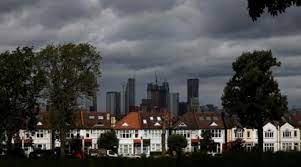UK 2-year mortgage rates top 6%, adding to housing strains

London: – Two-year fixed-rate borrowing costs for British home-buyers topped 6% on Monday, reaching their highest since the period after September’s “mini-budget” crisis and adding to strains that are weighing on the housing market.
British lenders have raised interest rates sharply in recent weeks as stubbornly high inflation has pushed up expectations among investors for where Bank of England rates will peak.
The BoE is expected to raise its borrowing costs for a 13th time in a row on Thursday as it attempts to tackle stubbornly high inflation.
Financial data company Moneyfacts said the average rate for a new two-year fixed-rate mortgage reached 6.01% on Monday, the highest since Dec. 1 and up from 5.98% on Friday. The average five-year fixed rate increased to 5.67% from 5.62%.
Most UK home-buyers take out mortgages which have a fixed rate for two or five years, after which they pay a floating rate or refinance at a new fixed rate.
Mortgage brokers said rates ranged widely around the averages quoted by Moneyfacts, depending on borrowers’ credit risk and loan size, but were definitely on the rise.
“If customers have a good credit score, there are 2-year fixed rates below 6%,” said Elliott Culley, director at Switch Mortgage Finance. “However, this is in stark contrast to just two to three weeks ago, when you could get a 2-year fixed rate under 5%.”
Two-year mortgage rates peaked at 6.65% in October when government bond yields shot up as markets baulked at the extra borrowing needed for then-Prime Minister Liz Truss’s tax cut plans.
Much of the impact of higher borrowing costs on mortgage-holders is yet to be felt. Industry body UK Finance said 800,000 fixed-rate mortgages will need to be refinanced in the second half of this year, and a further 1.6 million in 2024, out of a total of around 9 million residential mortgages.
The Resolution Foundation think tank estimated on Saturday that the average mortgage holder refinancing next year would pay an extra 2,900 pounds ($3,700) a year.
Prime Minister Rishi Sunak, who is facing the prospect of contesting a national election next year against the backdrop of a cost-of-living crisis, said on Monday that the best way to tackle the rise in borrowing costs was to bring down inflation.
“I know the anxiety that people will have about mortgage rates. That’s why the first priority I set out at the beginning of the year was to halve inflation,” he told ITV television.
Government minister Michael Gove said on Sunday that there were no immediate plans to provide new assistance to borrowers.
Rising mortgage rates are already having an impact on house prices, with property website Rightmove reporting that asking prices fell in early June for the first time in six years. June normally brings a seasonal rise in house prices.
While economists polled by Reuters last week predicted the BoE’s Bank Rate would peak at 5% in August or September, up from 4.5% now, investors expect increases beyond that. On Monday interest rate futures showed a slightly greater than 50% chance that BoE rates will reach 6% or higher early next year.
Two-year government bond yields – which reflect interest rate expectations, and influence lenders’ own borrowing costs – hit 5% on Monday for the first time since July 2008.





